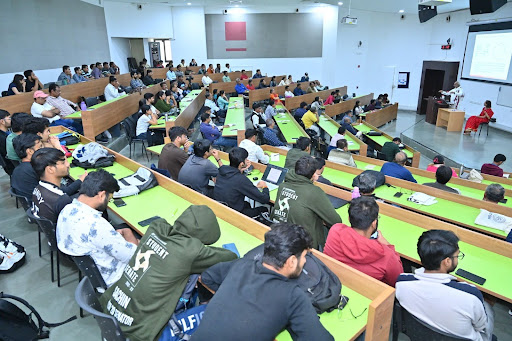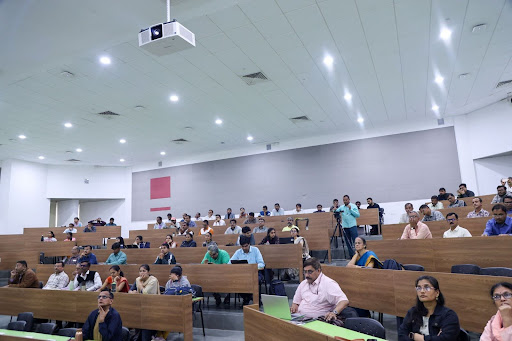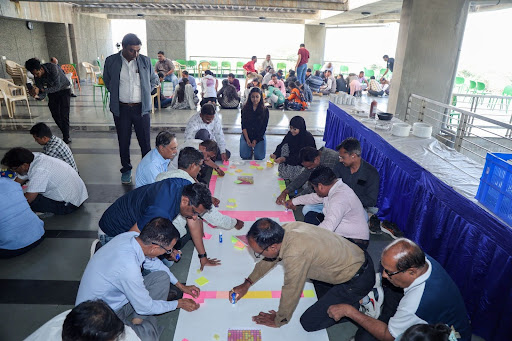STORY CREDITS
Writer: Saumya Mishra
Photo: IITGN photo
With an aim to introduce teachers to the rich history of mathematics in India, IIT Gandhinagar (IITGN) organised a workshop for school teachers titled ‘An Introduction to Mathematics in India’ from February 12-14, 2024 in its campus. The participants also had the opportunity to engage in diverse mathematical hands-on activities that they can conduct at their schools.
The workshop was sponsored by the History of Mathematics in India (HoMI) Project, IITGN and co-sponsored by the Indian Knowledge Systems (IKS) division of the Ministry of Education, Government of India. The three-day workshop was well attended by over 100 teachers from the states of Gujarat and Maharashtra.
The workshop featured sessions led by eminent speakers and experts from around the country as well as abroad in Mathematics and History of Mathematics. It was timed before the release of new textbooks by the National Council of Educational Research and Training (NCERT) to introduce the teachers to a new component in the books as part of implementing the National Education Policy 2020 (NEP2020) which is the introduction of mathematics in India and how it developed in India.

The workshop witnessed active participation and engagement from the attendees. A teacher asked at the beginning of the workshop: “Are we going backwards with the introduction of History of Mathematics in India School education?”, Another asked: “Do we now have to teach Sanskrit along with mathematics?”
Prof M D Srinivas, Visiting Professor, IITGN, answered that the goal was not to introduce Sanskrit. He said that there will be no Sanskrit in maths books but to learn from how the mathematicians thought and developed mathematics such as trigonometry, algebra, and the decimal systems.
One of the experts further added that the goal is not to glorify nor do we say that the Indians were the smartest and could develop a lot of mathematics but the goal of the introduction of history is to adopt a point of view inspired from the way that mathematics developed in India: as a tool to help in solving real life problems.
Experts added that mathematics developed in India to first study astronomy, and astronomy was developed in India to determine the date and time. It was crucial to determine date and time to be able to predict weather patterns as well as to develop navigation systems which depended on wind patterns. Further, the mathematics that was developed was not in terms of axioms and proofs but had a very algorithmic and computational approach. This way of approaching mathematics is the need of the hour as we now have much advancement in computer technology and this approach should be adopted in pedagogy, added experts.
In his session, Prof Amartya Dutta, Professor, ISI Kolkata, further explained the development of the decimal system and how it is related to the development of polynomials and is very effective for fast computation.
The workshop underscored the importance of teaching mathematical concepts in a manner that resonates with students. Several activities were demonstrated and discussed with the teachers that they could implement in their classrooms. Different ways of looking at various concepts and fundamentals was further emphasised. Even though the new books will only have some material, the teachers were encouraged to find more examples from real life that they can explain to students.
In the session with the Centre for Creative Learning (CCL), IITGN, the teachers witnessed how they can use innovative tools like different activities and music to teach recursive sequences and combinatorics, inspired from the work of Sarangadeva, the 13th-century Indian musicologist, and Virahanka, Indian prosodist and mathematician.
Most of these resources are available on the HoMI Project’s website for any teacher to access.
After the conclusion of the workshop, the feedback from the teachers was in stark contrast to their initial apprehension. One of the teachers said “I have learnt a lot especially for teaching trigonometry in the higher grades 9-12th and how I can conduct various geometric activities.” The general feedback was positive and encouraging, and several teachers expressed their willingness to return to ITGN for other such workshops.

The workshop featured a distinguished panel of speakers, including Prof Amartya Dutta, Professor, ISI Calcutta; Prof K Ramasubramaniam, Professor, IIT Bombay; Prof M D Srinivas, Visiting professor, IITGN; Prof M S Sriram, President of the K V Sarma Research Foundation, Chennai; Dr Shailesh Shirali, Director, Sahyadri School; Prof Venketeswara Pai, Professor, IISER Pune; Dr Ramakalyani Venkatraman, Research Associate, Kuppuswami Sastri Research Institute, Chennai; Dr Raghavasimhan Thirunarayanan, Visiting Professor, IITGN; Prof Manish Jain, Professor, IITGN; and Prof Tanya Srivastava, Assistant Professor, IITGN.

